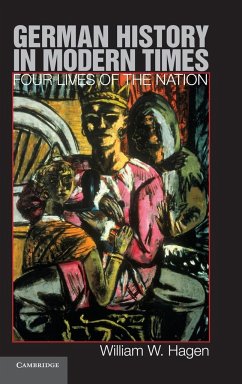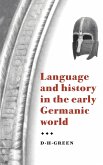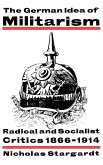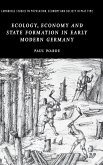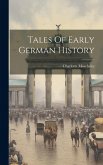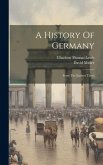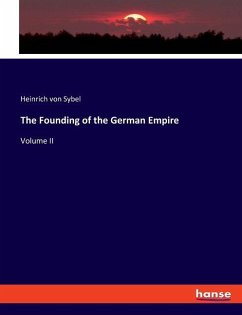- Gebundenes Buch
- Merkliste
- Auf die Merkliste
- Bewerten Bewerten
- Teilen
- Produkt teilen
- Produkterinnerung
- Produkterinnerung
This history of German-speaking central Europe presents the different eras of German history as successive worlds of German life, thought and mentality.
Andere Kunden interessierten sich auch für
![Language and History in the Early Germanic World Language and History in the Early Germanic World]() Dennis Howard GreenLanguage and History in the Early Germanic World151,99 €
Dennis Howard GreenLanguage and History in the Early Germanic World151,99 €![The German Idea of Militarism The German Idea of Militarism]() Nicholas StargardtThe German Idea of Militarism105,99 €
Nicholas StargardtThe German Idea of Militarism105,99 €![Ecology, Economy and State Formation in Early Modern Germany Ecology, Economy and State Formation in Early Modern Germany]() Paul WardeEcology, Economy and State Formation in Early Modern Germany136,99 €
Paul WardeEcology, Economy and State Formation in Early Modern Germany136,99 €![Tales Of Early German History Tales Of Early German History]() Tales Of Early German History35,99 €
Tales Of Early German History35,99 €![Bismarck and German Unity Bismarck and German Unity]() Munroe SmithBismarck and German Unity16,90 €
Munroe SmithBismarck and German Unity16,90 €![A History Of Germany: From The Earliest Times A History Of Germany: From The Earliest Times]() Charlton Thomas LewisA History Of Germany: From The Earliest Times48,99 €
Charlton Thomas LewisA History Of Germany: From The Earliest Times48,99 €![The Founding of the German Empire The Founding of the German Empire]() Heinrich von SybelThe Founding of the German Empire46,90 €
Heinrich von SybelThe Founding of the German Empire46,90 €-
-
-
This history of German-speaking central Europe presents the different eras of German history as successive worlds of German life, thought and mentality.
Hinweis: Dieser Artikel kann nur an eine deutsche Lieferadresse ausgeliefert werden.
Hinweis: Dieser Artikel kann nur an eine deutsche Lieferadresse ausgeliefert werden.
Produktdetails
- Produktdetails
- Verlag: Cambridge University Press
- Seitenzahl: 482
- Erscheinungstermin: 30. Mai 2014
- Englisch
- Abmessung: 240mm x 161mm x 33mm
- Gewicht: 972g
- ISBN-13: 9780521191906
- ISBN-10: 0521191904
- Artikelnr.: 33769050
- Herstellerkennzeichnung
- Libri GmbH
- Europaallee 1
- 36244 Bad Hersfeld
- gpsr@libri.de
- Verlag: Cambridge University Press
- Seitenzahl: 482
- Erscheinungstermin: 30. Mai 2014
- Englisch
- Abmessung: 240mm x 161mm x 33mm
- Gewicht: 972g
- ISBN-13: 9780521191906
- ISBN-10: 0521191904
- Artikelnr.: 33769050
- Herstellerkennzeichnung
- Libri GmbH
- Europaallee 1
- 36244 Bad Hersfeld
- gpsr@libri.de
William W. Hagen is Professor of History at the University of California, Davis. He has held fellowships from the Alexander von Humboldt Foundation, the National Endowment for the Humanities, the Max-Planck Society and the Institute for Advanced Study, Princeton. He is the author of Germans, Poles, and Jews: The Nationality Conflict in the Prussian East, 1772-1914 and the prize-winning Ordinary Prussians: Brandenburg Junkers and Villagers, 1500-1840 (Cambridge University Press, 2003). His wide-ranging research articles have appeared in many publications, including The Journal of Modern History, Foreign Affairs, the American Historical Review, Past and Present, Historische Zeitschrift and Geschichte und Gesellschaft.
1. Master narratives and rival interpretations of modern German history;
Part I. German Central Europe before Modern Nationalism: 2. The pyramid of
power in pre-modern Germany; 3. Baroque and Enlightenment Germany,
1648-1789; 4. Power states (Machtstaaten): the rise of the Prussian and
Austrian military-bureaucratic monarchies; 5. Aufklärung: the German
Enlightenment and other spirits of the age; Part II. German Identities
between Liberalism, Nationalism, and Socialism, 1789-1914: 6. Revolution on
the march: French challenge, German response, 1789-1815; 7. 'Land of poets
and thinkers': the transition from Enlightenment universalism to German
national culture; 8. Freedom and voice, 'blood and iron': the struggle over
liberalism and nationalism, 1815-1914; 9. Power to the people: German
social democracy in the age of industrialization; 10. Women, family,
feminism, 1789-1914; 11. Habsburg Austria: a multinational path in German
history; 12. Jews, Germans, German Jews, 1789-1914; Part III. Nation in
Crisis: Defeat, Turmoil, Aggression, 1914-15: 13. The Prussian-German
monarchy's sudden death: World War I and postwar revolution, 1914-20; 14.
Democracy's bitter fruits: society and politics, 1918-33; 15. The rise of
Hitlerism: middle-class discontent and populist utopia; 16. The 'people's
community' at Hitler's command: national and socialist Germany, 1933-45;
17. Lebensraum: the war for empire in Eastern Europe; 18. Banned from
nation and earth: German Jews after 1914, Nazi 'Jewish policy', and the
Holocaust; Part IV. The Cold War Germanies and their Post-1989 Fusion: A
Nation Reforged from Its Remnants?: 19. Return from the abyss: defeated
Germany and the West German Federal Republic, 1949-89; 20. 'Real existing
socialism': Soviet-occupied Germany and the German Democratic Republic,
1949-90; 21. Present-day Germany: the post-unification scene in West and
East.
Part I. German Central Europe before Modern Nationalism: 2. The pyramid of
power in pre-modern Germany; 3. Baroque and Enlightenment Germany,
1648-1789; 4. Power states (Machtstaaten): the rise of the Prussian and
Austrian military-bureaucratic monarchies; 5. Aufklärung: the German
Enlightenment and other spirits of the age; Part II. German Identities
between Liberalism, Nationalism, and Socialism, 1789-1914: 6. Revolution on
the march: French challenge, German response, 1789-1815; 7. 'Land of poets
and thinkers': the transition from Enlightenment universalism to German
national culture; 8. Freedom and voice, 'blood and iron': the struggle over
liberalism and nationalism, 1815-1914; 9. Power to the people: German
social democracy in the age of industrialization; 10. Women, family,
feminism, 1789-1914; 11. Habsburg Austria: a multinational path in German
history; 12. Jews, Germans, German Jews, 1789-1914; Part III. Nation in
Crisis: Defeat, Turmoil, Aggression, 1914-15: 13. The Prussian-German
monarchy's sudden death: World War I and postwar revolution, 1914-20; 14.
Democracy's bitter fruits: society and politics, 1918-33; 15. The rise of
Hitlerism: middle-class discontent and populist utopia; 16. The 'people's
community' at Hitler's command: national and socialist Germany, 1933-45;
17. Lebensraum: the war for empire in Eastern Europe; 18. Banned from
nation and earth: German Jews after 1914, Nazi 'Jewish policy', and the
Holocaust; Part IV. The Cold War Germanies and their Post-1989 Fusion: A
Nation Reforged from Its Remnants?: 19. Return from the abyss: defeated
Germany and the West German Federal Republic, 1949-89; 20. 'Real existing
socialism': Soviet-occupied Germany and the German Democratic Republic,
1949-90; 21. Present-day Germany: the post-unification scene in West and
East.
1. Master narratives and rival interpretations of modern German history;
Part I. German Central Europe before Modern Nationalism: 2. The pyramid of
power in pre-modern Germany; 3. Baroque and Enlightenment Germany,
1648-1789; 4. Power states (Machtstaaten): the rise of the Prussian and
Austrian military-bureaucratic monarchies; 5. Aufklärung: the German
Enlightenment and other spirits of the age; Part II. German Identities
between Liberalism, Nationalism, and Socialism, 1789-1914: 6. Revolution on
the march: French challenge, German response, 1789-1815; 7. 'Land of poets
and thinkers': the transition from Enlightenment universalism to German
national culture; 8. Freedom and voice, 'blood and iron': the struggle over
liberalism and nationalism, 1815-1914; 9. Power to the people: German
social democracy in the age of industrialization; 10. Women, family,
feminism, 1789-1914; 11. Habsburg Austria: a multinational path in German
history; 12. Jews, Germans, German Jews, 1789-1914; Part III. Nation in
Crisis: Defeat, Turmoil, Aggression, 1914-15: 13. The Prussian-German
monarchy's sudden death: World War I and postwar revolution, 1914-20; 14.
Democracy's bitter fruits: society and politics, 1918-33; 15. The rise of
Hitlerism: middle-class discontent and populist utopia; 16. The 'people's
community' at Hitler's command: national and socialist Germany, 1933-45;
17. Lebensraum: the war for empire in Eastern Europe; 18. Banned from
nation and earth: German Jews after 1914, Nazi 'Jewish policy', and the
Holocaust; Part IV. The Cold War Germanies and their Post-1989 Fusion: A
Nation Reforged from Its Remnants?: 19. Return from the abyss: defeated
Germany and the West German Federal Republic, 1949-89; 20. 'Real existing
socialism': Soviet-occupied Germany and the German Democratic Republic,
1949-90; 21. Present-day Germany: the post-unification scene in West and
East.
Part I. German Central Europe before Modern Nationalism: 2. The pyramid of
power in pre-modern Germany; 3. Baroque and Enlightenment Germany,
1648-1789; 4. Power states (Machtstaaten): the rise of the Prussian and
Austrian military-bureaucratic monarchies; 5. Aufklärung: the German
Enlightenment and other spirits of the age; Part II. German Identities
between Liberalism, Nationalism, and Socialism, 1789-1914: 6. Revolution on
the march: French challenge, German response, 1789-1815; 7. 'Land of poets
and thinkers': the transition from Enlightenment universalism to German
national culture; 8. Freedom and voice, 'blood and iron': the struggle over
liberalism and nationalism, 1815-1914; 9. Power to the people: German
social democracy in the age of industrialization; 10. Women, family,
feminism, 1789-1914; 11. Habsburg Austria: a multinational path in German
history; 12. Jews, Germans, German Jews, 1789-1914; Part III. Nation in
Crisis: Defeat, Turmoil, Aggression, 1914-15: 13. The Prussian-German
monarchy's sudden death: World War I and postwar revolution, 1914-20; 14.
Democracy's bitter fruits: society and politics, 1918-33; 15. The rise of
Hitlerism: middle-class discontent and populist utopia; 16. The 'people's
community' at Hitler's command: national and socialist Germany, 1933-45;
17. Lebensraum: the war for empire in Eastern Europe; 18. Banned from
nation and earth: German Jews after 1914, Nazi 'Jewish policy', and the
Holocaust; Part IV. The Cold War Germanies and their Post-1989 Fusion: A
Nation Reforged from Its Remnants?: 19. Return from the abyss: defeated
Germany and the West German Federal Republic, 1949-89; 20. 'Real existing
socialism': Soviet-occupied Germany and the German Democratic Republic,
1949-90; 21. Present-day Germany: the post-unification scene in West and
East.

